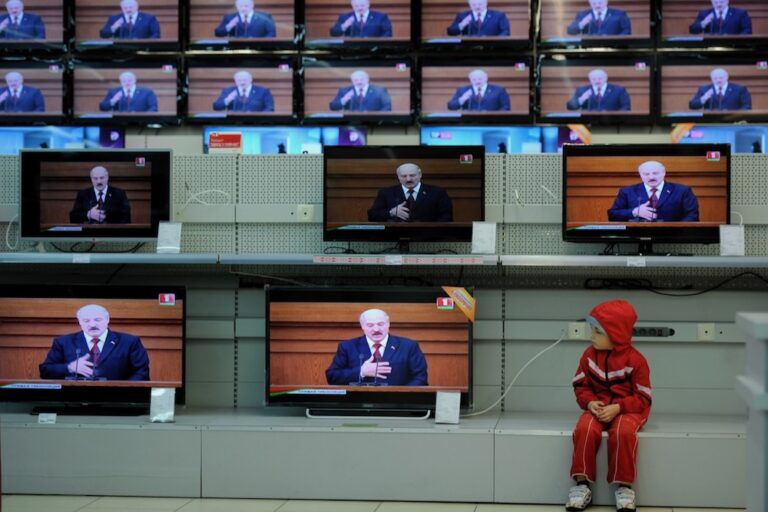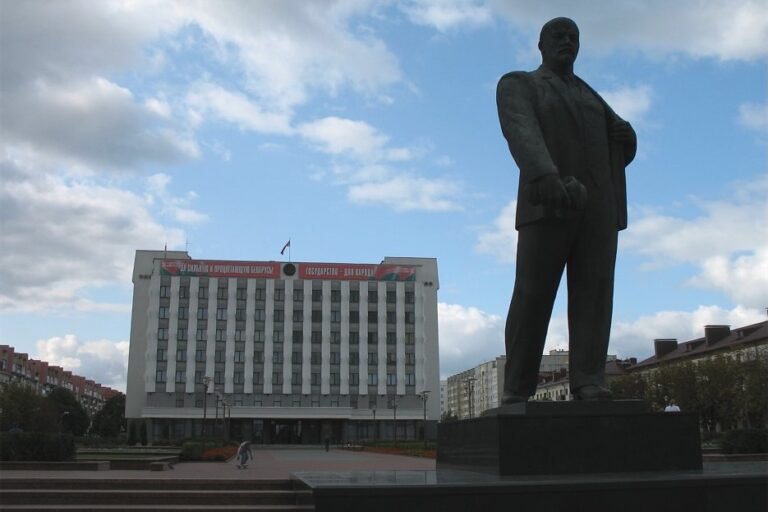Victims speaking to Human Rights Watch described beatings, prolonged stress positions, electric shocks and rape. Their serious injuries included broken bones, cracked teeth, skin wounds, electrical burns, and mild traumatic brain injuries.
This statement was originally published on hrw.org on 15 September 2020.
Belarusian security forces arbitrarily detained thousands of people and systematically subjected hundreds to torture and other ill-treatment in the days following the August 9, 2020 presidential election, Human Rights Watch said today.
The victims described beatings, prolonged stress positions, electric shocks, and in at least one case, rape, and said they saw other detainees suffer the same or worse abuse. They had serious injuries, including broken bones, cracked teeth, skin wounds, electrical burns, and mild traumatic brain injuries. Some had kidney damage. Six of the people interviewed were hospitalized, for one to five days. Police held detainees in custody for several days, often incommunicado, in overcrowded and unhygienic conditions.
“The sweeping brutality of the crackdown shows the lengths to which the Belarusian authorities will go to silence people, but tens of thousands of peaceful protesters continue to demand fair elections and justice for abuses,” said Hugh Williamson, Europe and Central Asia director at Human Rights Watch. “The United Nations and the Organization for Security and Co-operation in Europe (OSCE) should urgently set in motion inquiries to ensure that evidence is collected that could contribute to accountability for grave human rights violations.”
The UN Human Rights Council, which will hold an urgent debate on Belarus during the session that will run from September 14 to October 6, and the OSCE should promptly open inquiries.
Human Rights Watch interviewed 27 former detainees, 21 men and 6 women, nearly all of whom said they were arrested between August 8 and 12. Some were arrested as they took part in demonstrations that they described as peaceful; others were grabbed off the streets or from their cars. Many shared medical documents and photographs of injuries. At least five still had bruises and/or wore casts at the time of the interview. Human Rights Watch also spoke with 14 people with knowledge of the arrests and abuse, most between August 20 and 29, in Minsk, Hrodna, and Homiel, including witnesses to arrests, healthcare workers, and detainees’ relatives. Human Rights Watch also examined 67 video recordings and written accounts by former detainees and their relatives, either from public sources or shared directly with researchers.
On the basis of Human Rights Watch’s findings, much of the physical abuse by riot police and other law enforcement agents constitutes torture, as do the detention conditions that interviewees described.
From August 9 to 13, police arrested nearly 7,000 people amid an unprecedented wave of popular and largely peaceful protests. They alleged widespread election irregularities that led to the contested re-election of the incumbent, Aleksander Lukashenka, who has been in power since 1994.
With protests in their sixth week, Belarusian authorities have expelled, harassed, or stripped of accreditation dozens of foreign journalists and local journalists working for foreign and local independent outlets. Starting the first week of September, they have begun to again arrest protesters in large numbers, with the Interior Ministry reporting more than 600 detained on September 6 alone, and more than 300 in custody.
Tortured in Belarus – What Detained Protesters Endured at the Hand of Police
Detainees said that police, riot police (known as OMON, or Special Task Police Force), and special designation forces (Spetznaz) picked them up off the streets, in some cases using extreme violence, then beat them in dangerously confined spaces in vehicles where they had trouble breathing.
The security forces transported the detainees to police precincts and other detention facilities where they kicked, punched, and beat them with truncheons, forced them to stand, kneel, or lie in stress positions for hours, then held them for days in overcrowded cells. Police often denied detainees food and water and denied their requests to go to the toilet. All said they saw dozens of others subjected to similar or worse treatment.
In Hrodna, a 29-year-old journalist said that when he was arrested, despite displaying his press credentials, an OMON officer broke both his wrists. A medic described witnessing an incident in Minsk on August 11, in which an OMON officer trying to arrest a motorist who had stopped his car shot a rubber bullet point-blank at him. The medic said she treated the victim on the side of the road, but he ended up needing surgery to extract the bullet from his lungs.
The aim of the abuse, former detainees said, appeared to be to punish and humiliate. Most reported that OMON and other security forces singled out detainees with so-called “atypical” looks, such as men with long or dyed hair, and people with dreadlocks, piercings, or tattoos, for worse treatment and more insults.
Detainees said that police and guards confiscated detainees’ medications, frequently ignored calls for medical care, and in some cases denied it altogether. In one case, a detainee with a pre-existing medical condition was ill-treated and denied timely medical attention. He fell into a coma in custody and was clinically dead by the time he was transferred to a hospital. Three healthcare workers said they treated numerous demonstrators and former detainees injured by police. Some of those tortured asked the health workers not to file the violent injury reports that are required by law, for fear of retaliation.
All of those interviewed said they were denied access to a lawyer. Those taken before a judge said the proceedings lasted only a few minutes and ended with short arrest sentences for administrative offenses. Some of them said they were released early, most likely because of overcrowded detention facilities.
Those who had no court hearing said they were released within 72 hours, the maximum period allowed under Belarusian law before a court hearing is required. All said that when released, they had to sign a document promising not to participate in “unsanctioned assemblies,” and were given a written warning of criminal charges if they did.
Police and detention center officials failed to keep track of the thousands of people arrested, and detainees’ family members said they struggled, in many cases for days, to find out where their relatives were or what happened to them.
Dozens of former detainees lodged complaints with the authorities alleging cruel and degrading treatment by police. Human Rights Watch is aware of several preliminary inquiries launched by the authorities, but they have not yet opened a single criminal case at time of writing.
Belarusian human rights groups have filed a submission in the interests of 47 former detainees with the UN Committee Against Torture alleging cruel and degrading treatment by police.
On August 14, the deputy internal affairs minister denied that anyone had been beaten or tortured. On August 26, the prosecutor’s office announced the creation of an inter-agency commission to “objectively and fully” gather facts about any criminal acts by law enforcement, both during arrests and in detention facilities.
The torture and other ill-treatment Human Rights Watch documented violate many of Belarus’ international human rights obligations and commitments, including as a party to the International Covenant on Civil and Political Rights (ICCPR) and the UN Convention Against Torture, as well as a participating OSCE state.
The UN Human Rights Council decided on Monday that it will hold an urgent debate on Belarus. The council should pass a resolution asking the Office of the UN High Commissioner for Human Rights to monitor and publicly report on violations before, during, and after the elections, and to determine the facts and circumstances of such violations, with a view to pursuing accountability.
The resolution should also condemn the human rights violations in Belarus, including the disproportionate use of force against peaceful protesters, arbitrary arrests, ill-treatment, and torture. The council should call for the immediate release of those who remain in arbitrary detention, including journalists, protesters, opposition leaders, and their supporters.
OSCE countries should also trigger the so-called Moscow Mechanism for an investigation by an independent expert to establish the facts and present the results and recommendations to the OSCE.
“Torture survivors are courageously pressing for justice, and the UN and OSCE should play their part in ensuring justice for victims and accountability for those responsible for human rights violations in Belarus,” Williamson said.
For detailed accounts, please refer to the Human Rights Watch statement.



